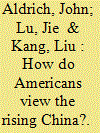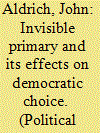| Srl | Item |
| 1 |
ID:
137445


|
|
|
|
|
| Summary/Abstract |
The dramatic increase in China's economic and hence political power and influence is a common story around the world. Just how clearly and well does this story get across to citizens of some nations other than China, itself? In particular, we ask what Americans know about China. Do they observe its rise? Are their views simple or rich and nuanced? How do they vary across the public? What leads to more positive and what leads to more negative views of China? We report the results of a survey of the American population designed to address these questions. We find that they are reasonably knowledgeable of China's rise and that they have rich and nuanced perceptions of a variety of dimensions of China, its society, economy and polity. These views are, on balance, not especially positive, but the more cosmopolitan the citizen, the more likely they are to hold positive views. Those who are Democrats, who are liberals, and who have had the opportunity to travel in China are especially likely to have positive impressions.
|
|
|
|
|
|
|
|
|
|
|
|
|
|
|
|
| 2 |
ID:
090230


|
|
|
|
|
| Publication |
2009.
|
| Summary/Abstract |
The current method for selecting presidential nominees by the two major parties went into place mostly in 1972 and certainly by 1976, after Buckely v. Valeo. It was the natural culmination of reform efforts over the history of the republic in that, while prior reforms consistently invoked greater openness and democratic governance as rationales for their adoption, this method actually empowered voters as the central figures in determining who would be nominated (see Aldrich 1987). This fact became fully evident almost at once. The selection via primaries of senator George McGovern in 1972 and governor Jimmy Carter in 1976 as the Democratic presidential nominees arguably not only would not have happened, they would not have even come close to winning nomination without successful appeal to the voting public.
|
|
|
|
|
|
|
|
|
|
|
|
|
|
|
|